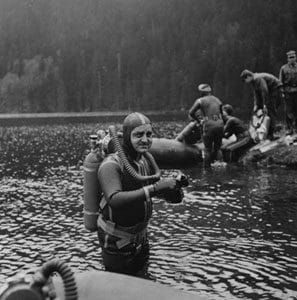Born Ladislav Bittman in Prague, Czechoslovakia, Martin-Bittman was an intelligence officer in the Czechoslovak Intelligence Service. His specialty: disinformation, in large part helping the Soviet Union’s cold war fight against the United States. Not just the obvious, like setting up brothels to snare western politicians in compromising photos, but also much more sophisticated ploys, like getting signatures of U.S. diplomats from Christmas cards to help “authenticate” fake documents of American “conspiracies” around the world. And he played a pivotal role in “Operation Neptune”. In 1968, he says, Czech TV was making a documentary at Black Lake, near Prague, to find “Nazi treasures” that were supposedly dumped in the lake during World War II. Czech intelligence dumped German military chests loaded with paper into the lake, and Bittman joined the expedition posing as a government official. He was a diver, and led the others to where he knew the chests lay to “discover” them — all under the eyes of Western journalists. Then other agents swooped in to say the chests had to be x-rayed for explosives. In the meantime, they had obtained forged documents from the USSR to implicate West Germans conspirators, and said they found them in the chests. “It was the start of a two-year campaign to revive the threat of Nazism and to point a finger at West Germany,” Bittman said later, “and say, ‘They are still there and West Germany is still in great potential danger.’”

“I openly admit that I did a lot of damage to the West, particularly to the United States, as a specialist in dirty tricks,” he said in 2009. But in 1968 the Soviets crossed him: the USSR (assisted by other Warsaw Pact members, Bulgaria, Hungary, East Germany, and Poland) invaded Czechoslovakia to put down the Prague Spring — the political liberalization of the country’s politics away from the Soviet hard line and increase democracy. Outraged, Bittman defected to the United States. The invasion “was the ultimate shock of my life,” Bittman said, “and this was the moment of truth when it was impossible to fool myself and justify anything I did in the past.” After spending a year being debriefed by U.S. intelligence officials, Bittman had to decide what to do next. He changed his name to Lawrence Martin-Bittman and, in 1972, joined the faculty of Boston University, teaching how propaganda and disinformation works so that it could be countered in the future. In 1974, a Czech military court convicted him of treason, and sentenced him to death.
He was not cowed: he wrote books outlining Soviet propaganda methods. “Bittman was really one of the great experts of the Communist bloc, the Soviet bloc, on disinformation,” says retired CIA official F. Mark Wyatt. “He is an outstanding defector success story.” In 1994, a Czech court overturned his death sentence. Martin-Bittman retired from teaching in 1996 after suffering a heart attack, and turned to art — he painted in watercolor, and opened his own gallery, which he named “Studio 006 and a Half”. He died September 18, 2018 at his home in Rockport, Mass., at 87.
